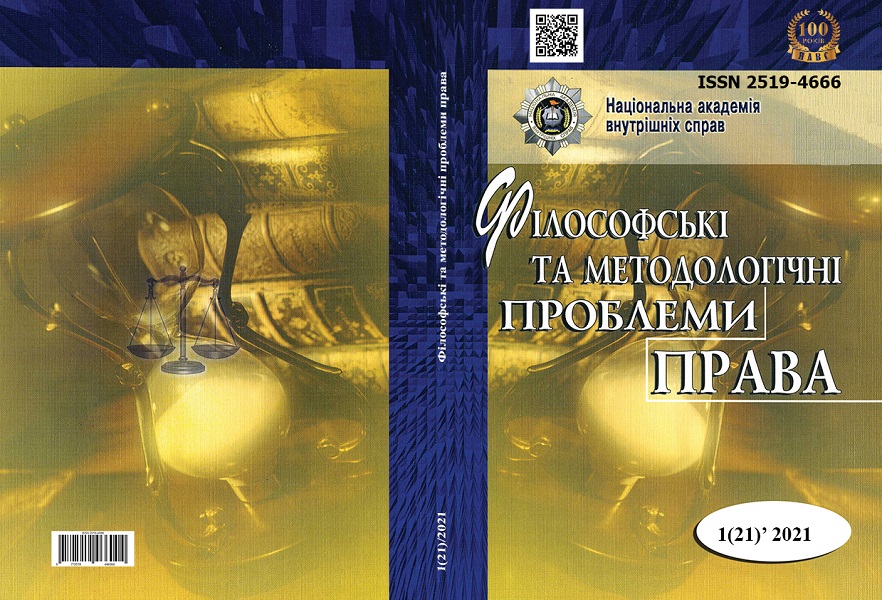Constitutional State and Property Transformation
Abstract
Purpose. The author seeks to investigate what kinds of property are acquired in the modern constitutional state. Modern society is difficult formation. Its development depends on the development of many components. The development of modern society is the result of development of political, legal, economic subsystems of society in the general understanding. A considerable role in this development is played by property. The article is devoted to the problem of the property and constitutional state. The phenomenon of the property presentation philosophical category of property. The property is important factor of development society and freedom of human. The main taskis researching of property, approaching to essence of this phenomenon. Methodology. The methodological basis of scientific search is a set of philosophical and philosophical principles of scientific knowledge, methodological approaches, general methods of thinking, philosophical and general scientific methods, the use of which provided the validity and reliability of the results of the study of basic values. Research methods are predefined by his character. Dialectical and system-structural methods, methods of logic, are used in the article foremost. The scientific novelty of the study is that it examines the specific links in the interaction between constitutional state and forms of ownership. Conclusions. The article analyzes the main conceptual approaches to understanding the nature of the property as a philosophical category. The author examines the most popular philosophical concept on property issues and their impact on the formation of public relations in the economic, social, legal, political and state of sence.
Keywords: constitutional state; private property; philosophical category of property; property; ownership; intellectual property.
Downloads
References
Baum D. R., Cooper R., Lusk-Stover O. Regulating market entry of low-cost private schools in Sub-Saharan Africa: Towards a theory of private education regulation. International Journal of Educational Development. 2018. No. 60. P. 100–112. doi: 10.1016/j.ijedudev.2017.10.020.
Bolatto S., Naghavi A., Ottaviano G., Zajc K. Intellectual Property and the Organization of the Global Value Chain. University of Bologna, 2019. URL: https://ideas.repec.org/p/cep/cepdps/dp1673.html.
Бутенко С. С. Питання власності в контексті теорії суспільного договору. Філософські та методологічні проблеми права. 2016. № 2. С. 189–197. URL: http://nbuv.gov.ua/UJRN/Fmpp_2016_2_18.
Бутенко С. С. Філософсько-правовий вимір власності як основи демократії : монографія. Київ : Кандиба Т. П., 2018. 188 с.
Череп О. Г., Кузнецова А. Є. Інтелектуальна власність та її вплив на конкурентоспроможність. Економічний простір. 2018. № 137. С. 180–189. doi: 10.30838/P.ES.2224.250918.190.238.
Демчишак Р. Інституційна сутність держави у світовій політичній думці. Humanitarian Vision. 2017. Vol. 3. No. 2. P. 31–36. doi: https://doi.org/10.23939/shv2017.02.031.
Іванова В. С. Правова держава: аналіз філософсько-правових концепцій. Юридичний науковий електронний журнал. 2019. № 5. С. 347–349. doi: https://doi.org/10.32782/2524-0374/2019-5/84.
Kaas L., Mellert J., Scholl A. Sovereign and private default risks over the business cycle. Journal of International Economics. 2020. Vol. 123. doi: https://doi.org/10.1016/j.jinteco.2020.103293.
Касинюк Л. А., Мельник Е. А. Правова держава та проблеми становлення її в Україні. Юридичний науковий електронний журнал. 2019. № 6. С. 28–32. doi: https://doi.org/10.32782/2524-0374/2019-6/4.
Корольчук Л. Рушійні сили розвитку нової світової цивілізації: імператив соціального інтелекту. Humanitarian vision. 2018. Vol. 4. No. 2. С. 26–31. doi: https://doi.org/10.23939/shv2018.02.026.
Кушнерук Д. В. Правова природа та особливості права державної власності. Право та державне управління. 2019. № 2 (35). С. 44–48. doi: https://doi.org/10.32840/pdu.2-1.8.
Лунячек В. Е., Рубан Н. П., Тіманюк В. М., Фесенко Н. С., Черненко Ю. Ю. Освіта в сфері інтелектуальної власності як умова сталого розвитку держави. ScienceRise. Pedagogical Education. 2017. № 11. С. 4–9. doi: 10.15587/2519-4984.2017.116197.
Михайленко Р. Власність і держава в контексті філософсько-правового осмислення. Філософські та методологічні проблеми права. 2020. № 1 (19). С. 53–57. doi: https://doi.org/10.33270/02201901.53
Петровський П. Проблеми та перспективи розвитку соціального інституту приватної власності в Україні. Ефективність державного управління. 2017. Вип. 3 (52). С. 91–97. doi: https://doi.org/10.33990/20704011.52.2017.149423.
Стовпець О. В. Інститут інтелектуальної власності в контексті соціально-філософського бачення проблеми співвідношення інформації, знань та інновацій. Філософські обрії. 2016. Вип. 35. С. 27–38. doi: https://doi.org/10.33989/2075-1443.2016.35.175101.
Abstract views: 410 PDF Downloads: 180
Copyright (c) 2021 Philosophical and Methodological Problems of Law

This work is licensed under a Creative Commons Attribution-NonCommercial-NoDerivatives 4.0 International License.
- Authors reserve the right to authorship of their own work and transfer to the magazine the right of the first publication of this work under the terms of the Creative Commons Attribution License, which allows other persons to freely distribute published work with mandatory reference to authors of the original work and the first publication of an article in this magazine.
- Authors have the right to enter into separate additional agreements on non-exclusive dissemination of the work in the form in which it was published in the journal (for example, to post an article in the institution's repository or to publish as part of a monograph), provided that the link to the first publication of the work in this journal is maintained.
- The journal's policy allows and encourages the posting of articles by authors on the Internet (for example, in electronic storehouses of institutions or on personal websites), both before the submission of this manuscript to the editorial office and during its editorial processing, as this contributes to the creation of a productive scientific discussion and positively affects the efficiency and dynamics of citing the published work.




